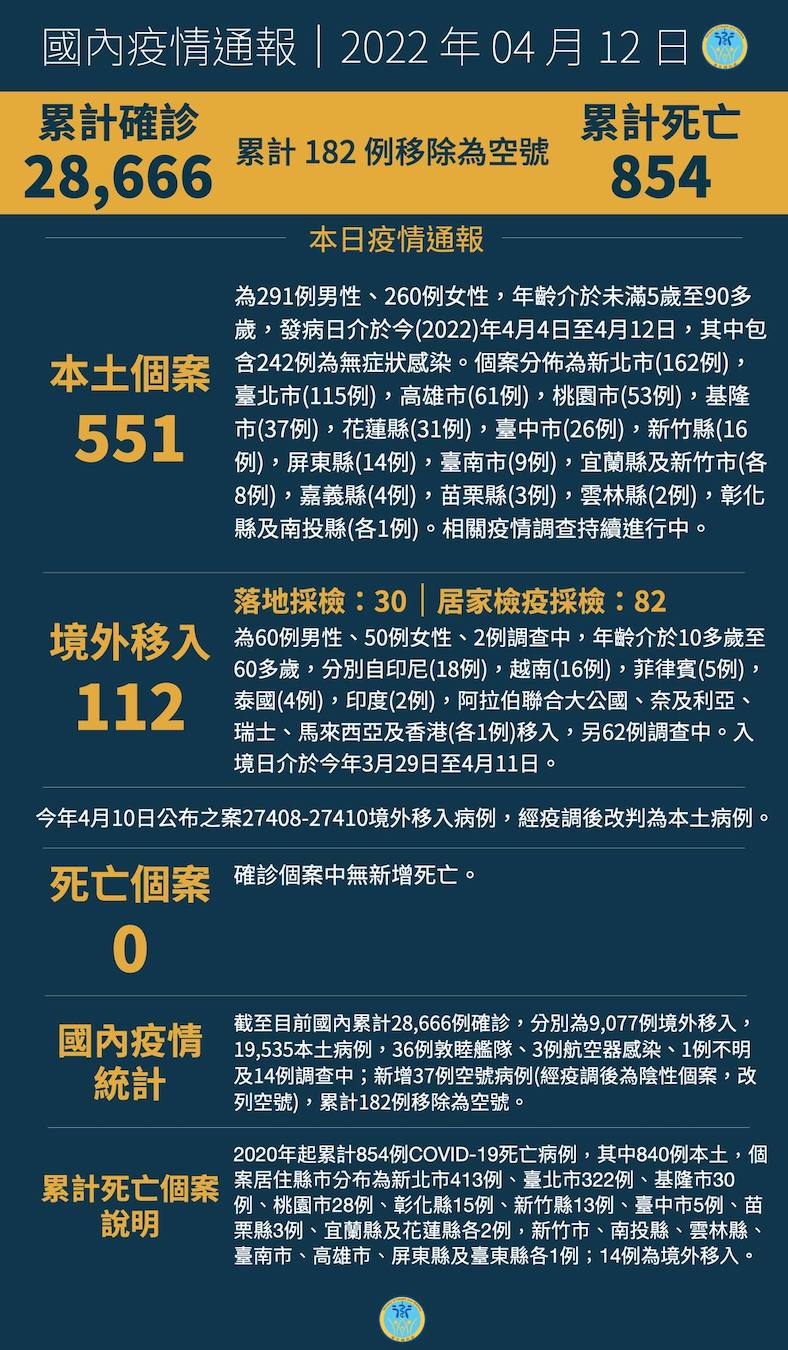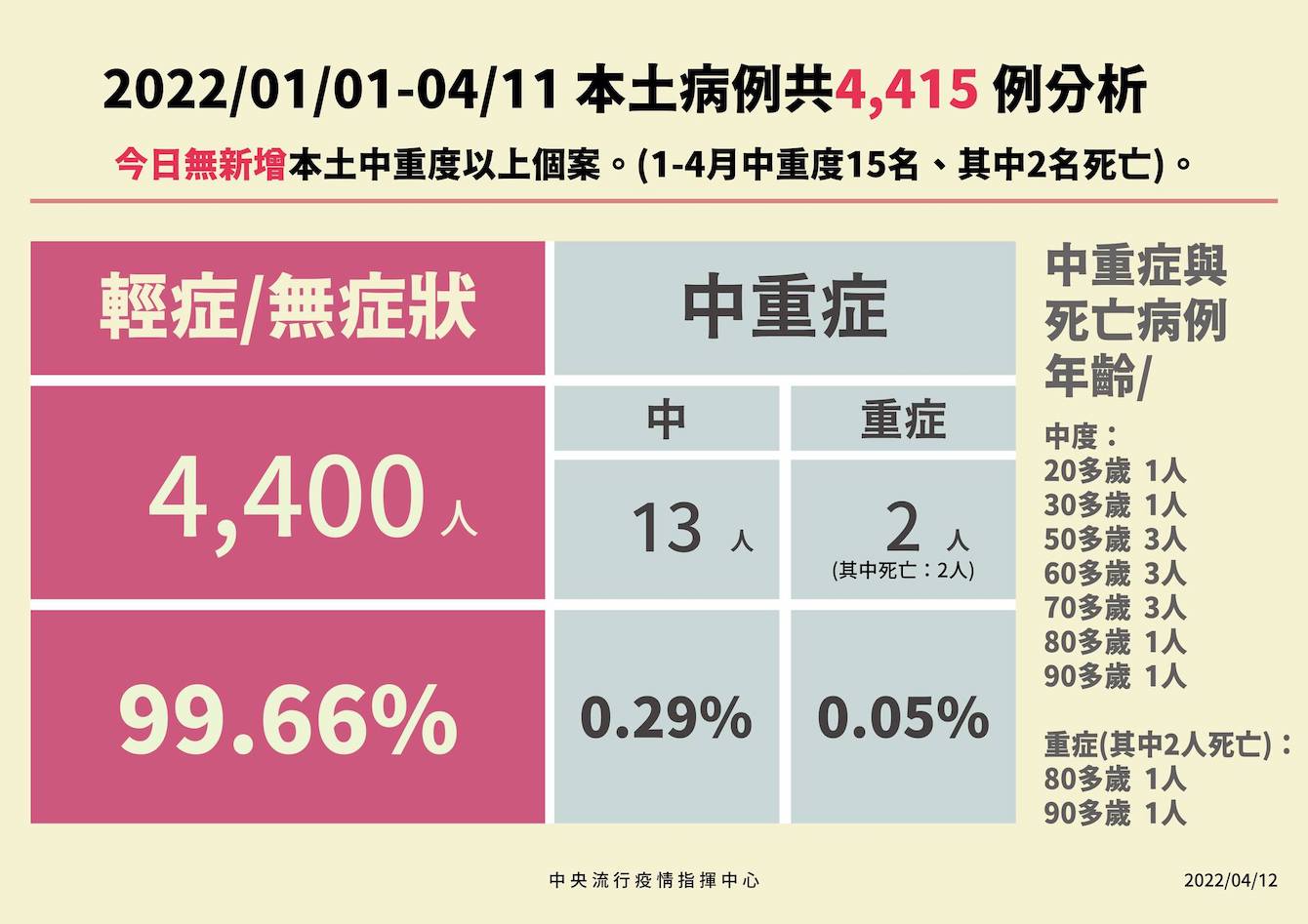by Brian Hioe
語言:
English
Photo Credit: Foxy Who/WikiCommons/CC
THE CENTRAL EPIDEMIC Command Center (CECC) reported 551 domestic cases, 112 imported cases, and zero deaths today. 551 domestic cases is the highest number of daily cases recorded in Taiwan since the start of the pandemic, though daily case counts from last year were subject to revision because of delays in processing backlogged COVID-19 test results. 30 of the imported cases were found on arrival, while 82 were found while in quarantine.
Taiwan is experiencing its second major COVID-19 outbreak. The first outbreak began last year in May, after more than a year in which Taiwan was largely COVID-free. However, Taiwan is currently transitioning away from the COVID-zero approach it maintained for most of the pandemic to date. This is partly to reconnect with the international world, for the sake of the economy, but also is carried out noting how efforts to maintain COVID-zero approaches indefinitely in China and Hong Kong have led to explosive spikes in COVID-19 cases recently.
Indeed, politicians in Taiwan began to speak of the need to eventually learn to coexist with COVID-19 early on, even if there was much political contestation between the pan-Green and pan-Blue camps during the outbreak last year about whether to escalate or de-escalate COVID-19 measures.
 Infographic on the cases from today. Photo credit: Ministry of Health and Welfare/Facebook
Infographic on the cases from today. Photo credit: Ministry of Health and Welfare/Facebook
It was never an issue of maintaining COVID-zero forever, but what proves concerning for Taiwan is that first dose vaccination peaked just past 80%, with elderly individuals remaining hesitant to get vaccinated. In March, only 75.5% of individuals above 75 had one dose of vaccination, 69.9% had two doses, and 50.1% had received booster shots. In particular, in order to attack the Tsai administration during the outbreak last year, the pan-Blue camp criticized the AstraZeneca vaccines that Taiwan had available as dangerous. Fears of sudden death after vaccination subsequently became more widespread in Taiwanese society, including with other vaccine brands.
Minister of Health and Welfare Chen Shih-chung has stated that before the end of April, the number of daily cases will exceed 1,000 per day. Among those currently in quarantine due to contact with COVID-19 cases is President Tsai Ing-wen, who will be quarantining until Thursday after sharing a meal at the Presidential Office with a relative later found to have COVID-19. The Tsai administration has spoken of a “new Taiwan model” to transition back to normalcy. The CECC has also sought to emphasize that its goals are no longer “COVID-zero” but “zero COVID” for serious cases.
However, priority is on avoiding overburdening Taiwan’s hospital system currently. As such, home quarantine rules have loosened to allow for home quarantine for light and mild cases under 65. Individuals under home quarantine can live with others, so long as they have their own bathroom. Likewise, testing requirements to be released from quarantine have been changed to allow for the use of rapid antigen tests.
In the meantime, efforts to boost vaccination among elderly individuals continue, with cash rewards for vaccination extended. Cancellations have taken place at schools with COVID-19 cases, but new rules will specify that classes are canceled when 1/3rd of students or staff are found to have COVID-19, rather than the current two cases. 237 schools in 18 counties and cities currently have canceled classes.
The CECC has stated that it has signed a deal with Pfizer to purchase 700,000 doses of COVID anti-viral Paxlovid. 350,000 doses are slated to arrive by the end of June. Taiwan previously ordered 20,000 doses, of which 136 have been used.
Most cases in Taiwan are currently considered light or mild. Of the 4,415 COVID-19 cases reported this year, 4,400 are considered mild, while 13 are considered of medium-concern and two serious. Taiwan has added another death since the start of this most recent wave of COVID-19.
 Infographic on the current number of light, medium, and severe cases from today. Photo credit: Ministry of Health and Welfare/Facebook
Infographic on the current number of light, medium, and severe cases from today. Photo credit: Ministry of Health and Welfare/Facebook
The CECC has indicated an emphasis on trying to track COVID-19 contacts through its social distancing app. The app will detect when an individual has come within two meters of someone with COVID-19. The CECC hopes for the app to be used during mass gatherings, and this app will be used in conjunction with the current QR code contact registration system.
Boosters shots are now required for many public events. Members of the military have been ordered to get booster shots, as are employees of other sectors.
For the most part, society seems to be becoming accustomed to living with COVID-19. One notes that reporting on COVID-19 is not as ubiquitous in the news as last year–even if it is still a major news story. More generally, so long as current medical capacity holds, the CECC is still shifting measures in the direction of loosening measures. When questioned in the legislature, for example, Chen did not rule out that Taiwan could have no quarantines for returnees by summer, even as plans are still to phase out quarantine gradually rather than to drop measures immediately.

